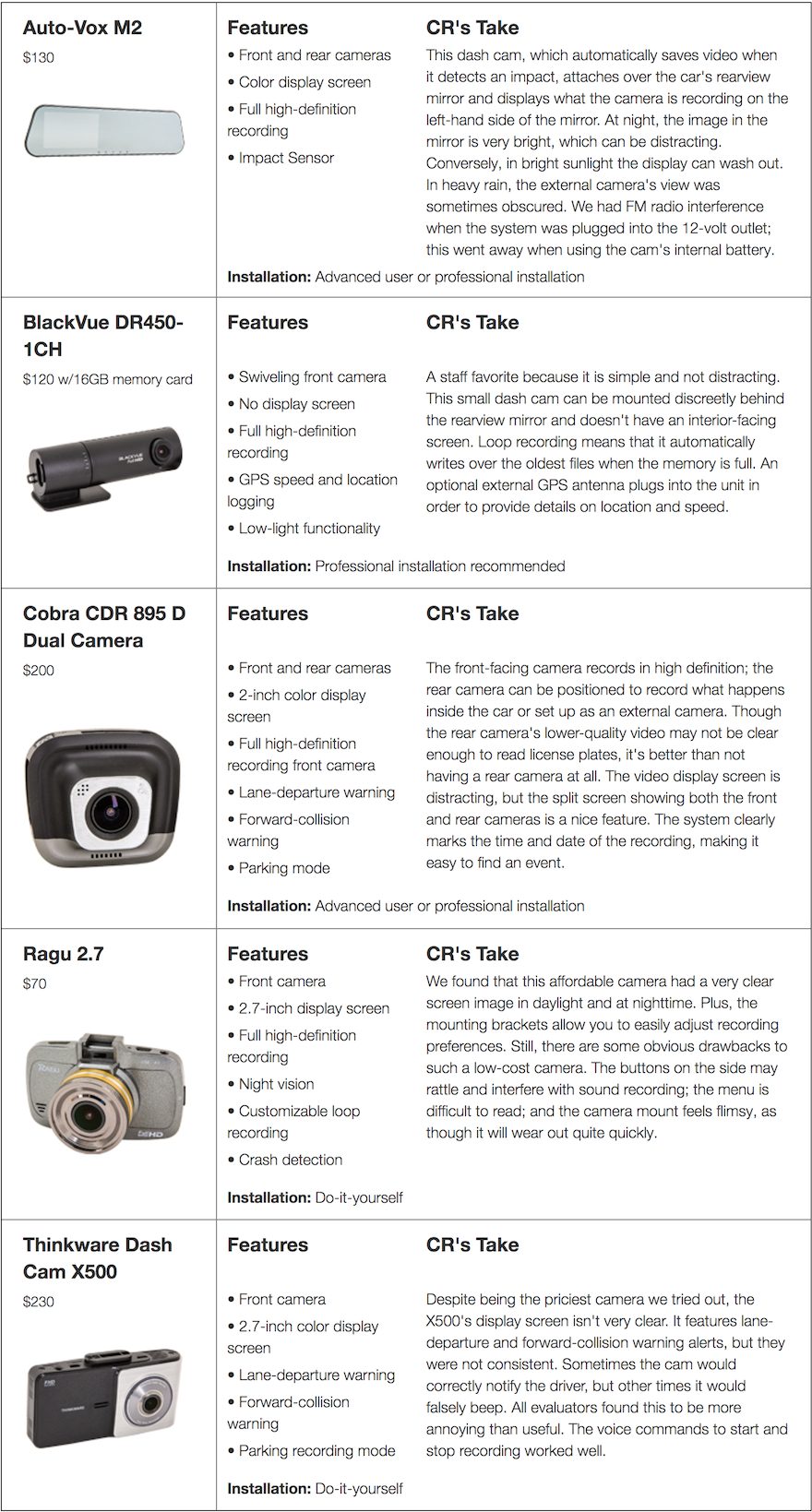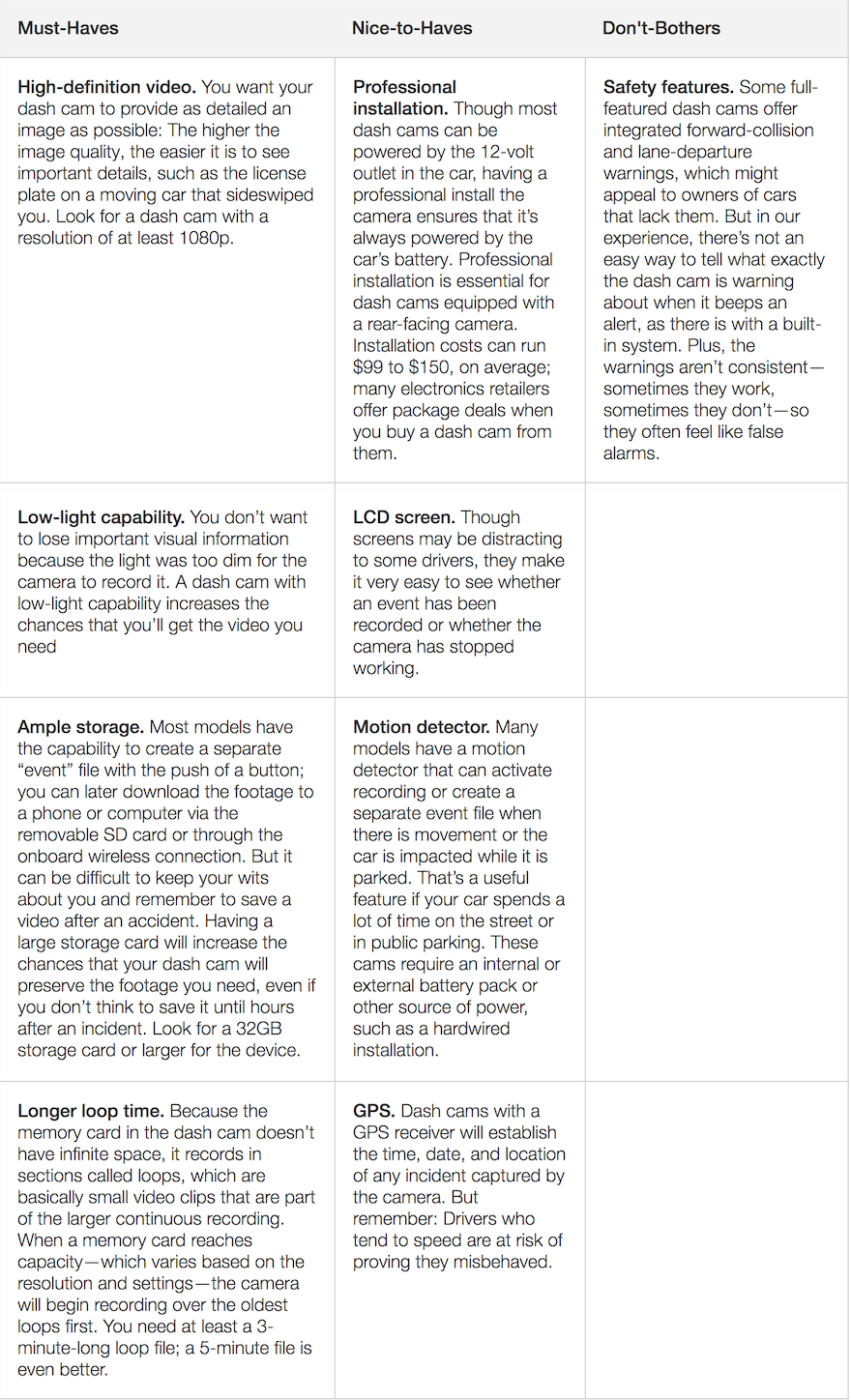Dash Cams: Coming To A Dashboard Near You Image courtesy of Consumer Reports
You’re driving calmly along when, suddenly, a small truck sideswipes your passenger door, taking your sideview mirror with it. Your heart is pounding and you both stop, whereupon the other driver starts shouting that you swerved into his lane—when you know for a fact that you did no such thing. Now it’s just your word against his. Anticipating the headache of filing a police report and arguing over the insurance claim, you think, “If only I had a video!”
Well, now you can. Dash cams are small video cameras (priced from $50 to more than $200) that can be mounted to your car’s dashboard or windshield to record what happens in front of the vehicle. More advanced models can also record interior audio and video, and rear-facing video, and even display on your rearview mirror or stream to the internet.
U.S. wholesale shipments of these digital sentinels are steadily climbing, due largely to falling prices and growing consumer awareness. According to the Consumer Technology Association, they were up 10 percent in 2016, and are projected to rise an additional 15 percent in 2017 and generate $68 million in revenue for the year. “I would describe dash-cam sales growth as brisk, but it is a niche category,” says Steve Koenig, senior director of market research at CTA.
“For now, dash cams that you stick on the windshield are still the most popular,” says Carl Mathews, senior director of mobile merchandising at Crutchfield, one of the electronics retailers rated most highly by Consumer Reports readers. (Some states prohibit devices attached to the windshield. Be sure to check local laws before committing to a purchase.) “But we’re also seeing growth in sales of products that integrate dash cameras into portable navigation units and rearview mirrors that can also serve as displays for rear cameras.” Crutchfield customers pay an average of $150 for a dash cam, Mathews says.
Recording pictures or video in public is a right protected by the First Amendment, so it’s generally legal to use a dash cam to record whatever is outside the car on public roads, as long as you don’t violate any laws or interfere with a traffic, police, or rescue operation. Recording inside the car is another matter: Drivers with dash cams that have the ability to record audio inside the car need to know that in many states it’s illegal to record conversations without informing all parties first. In other words, it’s up to the driver to notify all passengers that they’re being recorded. (Alternatively, you could simply disable the microphone.)
To help you decide whether a dash cam is worth the investment, here are five of the top reasons people buy one:
1. Evidence for Insurance Claims
“At first, I thought dash cams looked like cool toys,” says Utah college student Rob Sanders. But Sanders says he stopped thinking of dash cams as toys after he witnessed a serious hit-and-run accident on the freeway. “I realized that if I’d been the one who was hit, I’d have had no evidence to give to my insurance or to the police. Having a dash cam gives me peace of mind. I know that if someone hits me, I can prove it to an insurance company.”
Insurers don’t currently offer discounts on premiums for dash-cam owners, but they will review dash-cam footage of an accident, just as they accept photos snapped on the scene with a cell phone. Dash-cam footage is more reliable than witness accounts and can be extremely useful to the insurance company in determining liability.
“Insurers always welcome additional information about how one of their policyholders incurred a loss. As such, insurers generally like when an individual produces dash-cam footage to assist with a claim,” said Michael Barry, a spokesman at the Insurance Information Institute, in a statement. Similarly, East Haven, Conn., Police Lieutenant Joseph Murgo says that the proliferation of dash cams is making it easier for the police to investigate traffic incidents of all kinds by allowing them to document witness statements and produce evidence for the court.
Sanders, the college student, pointed out that, because his dash cam records audio inside the car, he can dictate the license plate number and description of another vehicle, even if it isn’t visible on the footage—information that could be used to file a police report or to help with interactions with insurance companies. But, again, those who have a dash cam that records audio inside the car need to know whether their state requires them to inform passengers that they’re being recorded.
2. Silent Guardian
Urbanites who park their cars on the street are turning to dash cams for a measure of protection against robbery and vandalism. Some pricier models that can record a 360-degree perspective, have an impact sensor, and are able to notify the owner if there is any impingement to the car are best suited to this task. Once the gyro-enabled impact sensor is triggered, the camera creates a separate “incident” file that saves video from just prior to the impact and for an additional 1 to 5 minutes after—footage that could be essential to a police investigation if a car is broken into or struck while it’s parked.
3. Video Corroboration
Dash cams can also provide solid evidence that you’re not guilty.
A few weeks after driving through Pennsylvania, reader Adam Osmond received a ticket in the mail for failing to pay a toll. Osmond successfully disputed the charge because he not only had footage of himself paying the toll but also of his conversation with the toll booth operator.
Remember, though, that your own footage can potentially be used against you. For example, in some states if your dash camera documents that you are exceeding the speed limit, you could be held partly liable for an accident—even if the other driver was primarily at fault.
4. A Reliable Witness
Interest in dash cams has also been fed by videos of motorists having altercations with police and reported incidents of minority drivers being stopped without cause. Studies like the Connecticut Racial Profiling Prohibition Project’s 2016 Traffic Stop Analysis and Findings suggest that some drivers do have a reason to be concerned: In some towns in the study, the rate of traffic stops among minorities was significantly higher during the day than during evening or nighttime hours, when it could be harder to identify a driver’s skin tone. Cameras can provide an impartial witness in disputes about racial profiling because, as Lieutenant Murgo tells us, “Emotions are captured. Cameras don’t see the color of one’s skin.”
It’s legal to use a dash cam to document interactions with police during a traffic stop, but we recommend that you notify any members of law enforcement that they are being recorded, just as you should notify occupants of your car. “Everyone tends to conduct themselves better when they know they’re on camera,” Lieutenant Murgo says.
5. Personal Security
Some cams can provide an extra measure of security if a stranger approaches you when you’re parked and alone in a lot or stopped at an intersection.
Surround-view dash-cam models can get a shot of creepy interlopers no matter what direction they approach from. Models that are hardwired to the vehicle’s battery or that have an internal battery can document any encounter even if the car is not running.
Candid Cameras
To get some firsthand experience with the different types of dash cams, we purchased and installed five different models in our vehicle test fleet so that the team at the CR Auto Test Center could try them for several weeks. The automotive staff recorded their thoughts and impressions about each device in a logbook to help you decide which one best suits your needs. Click image to enlarge.

Dash Cam Features
Want more consumer news? Visit our parent organization, Consumer Reports, for the latest on scams, recalls, and other consumer issues.


